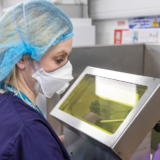CEO Chris Molloy explains why patients and medical research charities are so vital to the work of Medicines Discovery Catapult.
Next week the Medicines Discovery Catapult will be joining representatives of industry and medical research charities at the Patients First conference, organised by AMRC and ABPI . We will be exhibiting and sponsoring a panel session on The Future for Science, Medicine and Health Research, as well as networking and listening to key speakers as they explore what it really means to put patients at the heart of medicines discovery.
We exist to help accelerate the discovery and proof of new medicines in the UK, and we believe that the voice and insight of those that need new therapies should be centre-stage of the process. We are engaging with patient groups and charities to cornerstone new disease-centred syndicates that will bring together patients, clinicians, drug-hunting academics and industrial know-how to deliver ‘fast to patient’ solutions.
Putting the voice and insight of patients centre-stage is not just a nice thing to do, it is essential if we are to find new ways to accelerate discovery and development. Why?
First, because patients cannot wait
Patients, their clinicians and charity stakeholders have an absolute knowledge of unmet clinical need, and are vital influencers of what should fill the clinical pipelines of the future. Whilst great science will always underpin major advances in medicine, patients – not publications – should set the agenda.
Second, because the answer is in the patient
Today’s R&D starts with more refined biological targets validated from human disease in human tissues. Patients’ consent to provide these tissues – and to have them used in research – is critical, as is their understanding of the outcomes and experience of their condition. This provides the context for scientists to find the weakness in the disease so it can be fought.
Once safe medicinal drug candidates have been constructed, patients play another pivotal role: clinical proof. Having ready access to small groups of patients who are willing to try potential new treatments is vital. Engaging patients only when the race is half-won is often too late
Third, because Charities have a natural network and trust
Charities are vital to the medicines discovery community but their understanding is often underused by industry. By enabling charities to play a key role in disease-based consortia, we can harness their expertise to build a portfolio of new targets, assets and ideas and provide them with access to core capabilities in science and technology, allowing these syndicates to thrive.
Fourth, because the time is right
The existing model of drug development in the pharmaceutical industry is not suited to the new paradigm of precision and personalised medicines. Yet the need for such therapies is getting greater and greater all the time. That means we need new models of innovation to bring new, promising drug candidates into clinical trials more quickly and given greater chance to progress to clinical use.
That’s why many medical research charities in the UK are looking to invest more of the £1 billion currently invested by the sector into “translational” research alongside basic science. They know that this has a better chance of having a greater impact on those they represent.
Some larger charities are starting to work with industry to determine the best targets to follow, influencing the translational R&D agenda and deciding who to work with to rapidly develop promising new medicine assets. Some are also considering how to bring additional routes of investment to the table to fuel this expensive – and risky – pipeline. This scientific and financial expertise is not always available to charities, which is where MDC syndicates can help – bringing in partners to provide the right industrial knowledge and financial asset management skills.
By working in partnership with patient charities in new collaborations with industry and others, I have no doubt that we can break down the barriers that are holding back the creation of potential new medicines – and make a real difference to people’s lives.
Chris Molloy’s blog is also featured as a Guest Blog for the Association of Medical Research Charities




